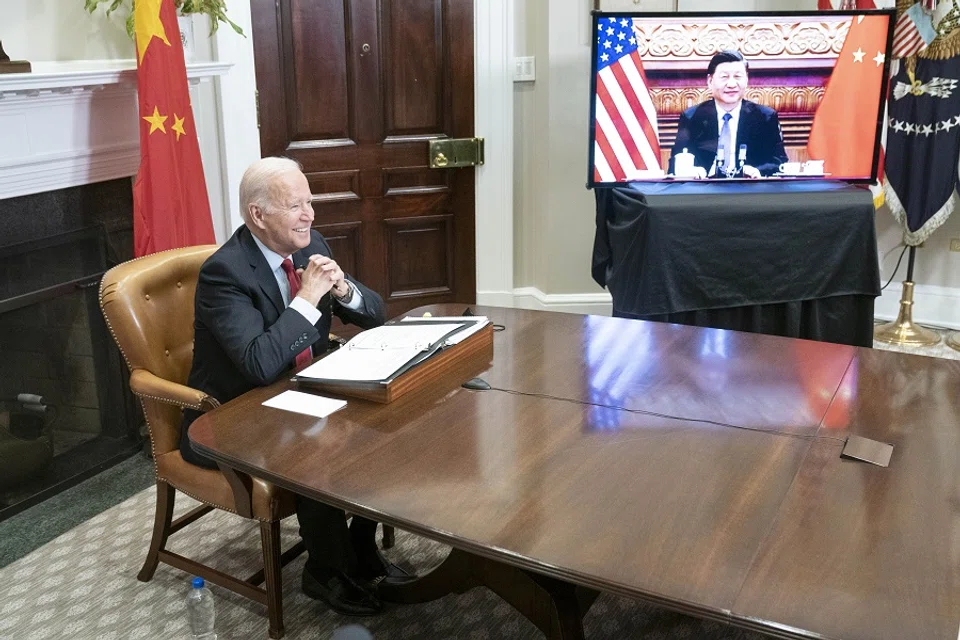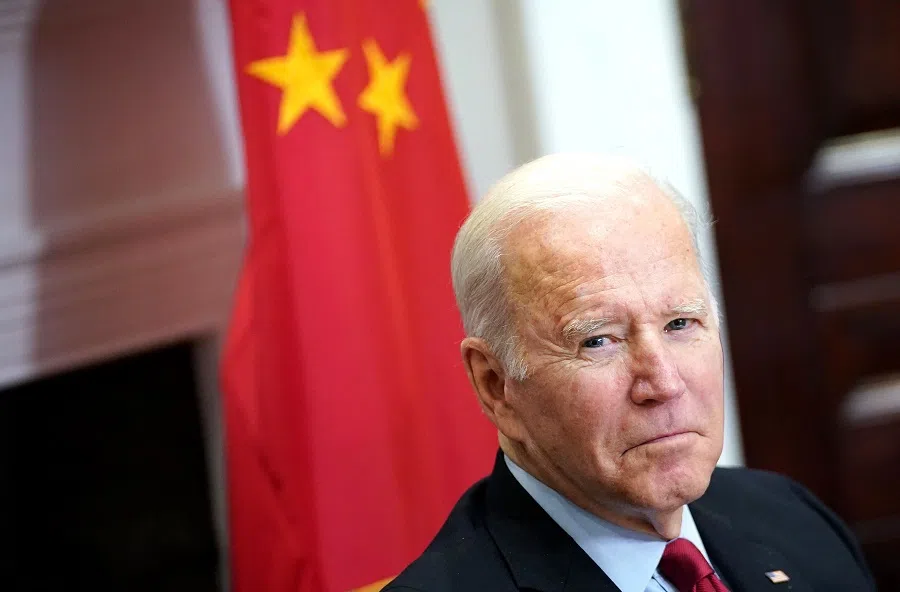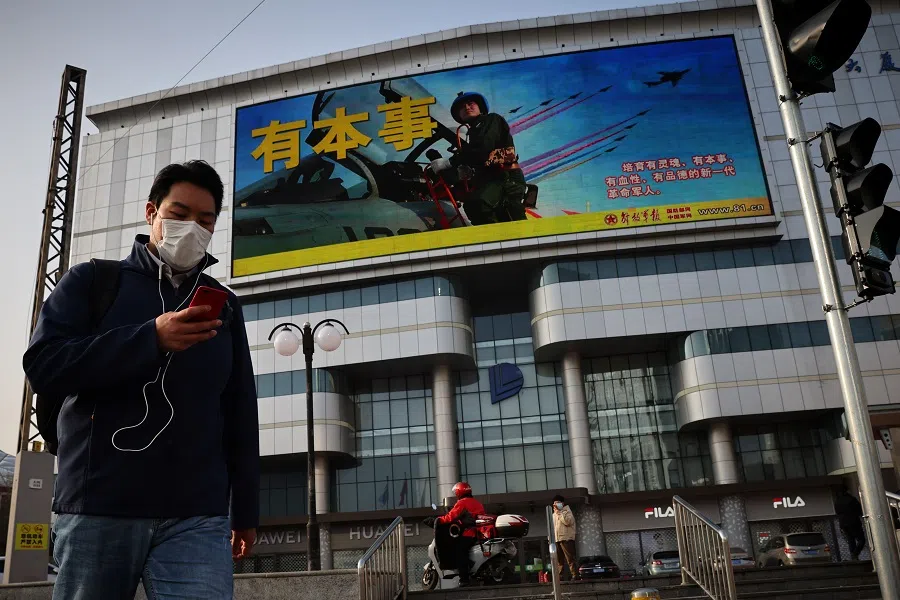Biden-Xi virtual summit: Not quite a meeting with an 'old friend'
Yang Danxu observes that the recent virtual meeting between US President Joe Biden and Chinese President Xi Jinping is a good start, but deep-seated issues remain, not least the real and present issue of Taiwan.

The highly anticipated Xi-Biden meeting was conducted yesterday, bringing some relief to tense China-US relations. Compared with the clashes between senior officials of both countries during their first high-level meeting in Alaska earlier in March, Chinese President Xi Jinping and US President Joe Biden sat before their screens and started the talks on a friendlier, warmer note.
At the meeting, Biden wore a red tie in a nod to Chinese colours, while Xi wore a blue one, representing the colours of the Democratic Party. Both parties had a smile on their face and were polite in each of their opening remarks.
Biden delivered his remarks first, beginning by reminiscing about old times with Xi, hoping that both of them could meet face to face next time "like we used to when we travelled through China".
Burden of being an 'old friend'
Biden was already acquainted with Xi before becoming president. When he visited China in 2011 as vice-president, then Chinese Vice-President Xi accompanied him on the entire trip. It was reported that the pair spoke for over ten hours over the five-day trip and visited Dujiangyan in Sichuan, where they played basketball at a local high school. The following year, Xi visited the US and was received by Biden. When Biden visited China again in 2013, Xi, who had become the Chinese president then, called Biden "my old friend".
...when the Chinese call someone their "old friend", they simply mean that they have known them for a long time, but do not necessarily consider them their "true friends".

This moniker "old friend" has put somewhat of a burden on Biden in the US. In June, Biden, who had already taken office, felt the need to publicly declare, "Let's get something straight. We know each other well; we're not old friends. It's just pure business." A few hours before the meeting yesterday, White House press secretary Jen Psaki insisted that Biden "still does not consider him an 'old friend'".
However, Biden's denial did not affect how Xi addressed him. In his opening remarks yesterday, Xi said, "I'm very happy to see my old friend." Their ambiguous "old friend" relationship leaves much food for thought.
According to a Chinese academic, when the Chinese call someone their "old friend", they simply mean that they have known them for a long time, but do not necessarily consider them their "true friends".
Other analysts commented that Xi had specifically addressed Biden as an "old friend" even though the latter had denied that relationship; while Biden had returned the greeting with a smile, he was in fact reminding China that all countries must follow the rules - the opening remarks of both top leaders were actually a tussle for the upper hand in terms of discourse and rhetoric.
Beijing is in no hurry to resolve the Taiwan issue
The mild opening statements were just the tip of the iceberg. Judging by the read-outs of the meeting released by both countries, beneath the veiled comments, both sides held fast to their positions on Xinjiang, Hong Kong and other issues. Their sharpest conflict was over the Taiwan issue, which is also the most real and pressing issue that both parties must manage.

According to information released by the Chinese foreign ministry, Xi criticised "repeated attempts by the Taiwan authorities to look for US support for their independence agenda as well as the intention of some Americans to use Taiwan to contain China", leading to tensions in the Taiwan Strait. For the first time, he said: "China is patient and seeks peaceful reunification with great sincerity and effort."
This gives a clear signal that Beijing is in no hurry to resolve the Taiwan issue, and it is also a response to the current swell of calls within mainland China for armed reunification, showing that contrary to some speculation, the top leaders do not intend to take back Taiwan in the near future through a snap war.
However, at the same time, Xi also showed his cards to Biden for the first time, giving a stern warning that "decisive measures" would be taken "if Taiwan secessionists provoke, or even cross the red line". In other words, while Beijing is committed to maintaining the status quo, it will not tolerate "Taiwan independence". But the recent warming of official and semi-official US-Taiwan relations and greater interaction between both would seem to Beijing like moving towards the "red line".

But how does Washington see the signals from Beijing? Information on the White House website shows that during the meeting, "Biden underscored that the United States remains committed to the "one China" policy, guided by the Taiwan Relations Act, the three Joint Communiqués, and the Six Assurances, and that the United States strongly opposes unilateral efforts to change the status quo or undermine peace and stability across the Taiwan Strait."
Different perceptions of maintaining the status quo
Beijing has declared that it wants to rejuvenate the Chinese people, and cross-strait reunification is one key item on the agenda. But the way Washington sees it, Beijing is the one that wants to change the status quo, and the increasing pressure from the People's Liberation Army is spoiling the current stability in the Taiwan Strait.
So, will this meeting between the two leaders take away the uncertainty and remove the alarms of possible military conflict in the Taiwan Strait?
He will face pressure from various directions as influenced by domestic politics, and it is very uncertain to what extent Biden's personal intentions will withstand being hijacked by other factors.

While Biden clearly reiterated being in line with Beijing's "one China" policy, this is not just based on the three joint communiques, but also includes the Taiwan Relations Act, which is a different understanding of the "one China" policy. More importantly, compared to Xi's firm authority and dominant political status within China, Biden does not have such an advantage in leading Washington in fulfilling the commitments made during this meeting. He will face pressure from various directions as influenced by domestic politics, and it is very uncertain to what extent Biden's personal intentions will withstand being hijacked by other factors.
The clouds will not immediately lift on China-US relations because of this meeting, nor will the basic mood of bilateral competition change. However, it is a good sign that both sides are keeping their competition in check and are willing to sit down and talk. On the day of the meeting, China and the US reached an agreement to relax restrictions on journalist visas, and many industry colleagues are glad of this hard-won change. It remains to be seen whether China and the US will be able to resolve more issues.
Related: Xi-Biden virtual meeting: Only a 'more polite' meeting | Has the US shifted its position on Taiwan, again? | Both sides of the Taiwan Strait fear imminent war | Why the status quo in the Taiwan Strait is quietly changing | Peaceful or armed reunification: Are top Chinese advisers divided over Taiwan? | Taiwan's unequal status in US-Taiwan trade talks | 'Afghanistan today, Taiwan tomorrow'? | Chinese legal expert: 'Legal reunification' with Taiwan the best solution


![[Big read] When the Arctic opens, what happens to Singapore?](https://cassette.sphdigital.com.sg/image/thinkchina/da65edebca34645c711c55e83e9877109b3c53847ebb1305573974651df1d13a)


![[Video] George Yeo: America’s deep pain — and why China won’t colonise](https://cassette.sphdigital.com.sg/image/thinkchina/15083e45d96c12390bdea6af2daf19fd9fcd875aa44a0f92796f34e3dad561cc)